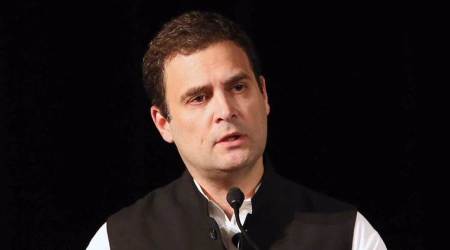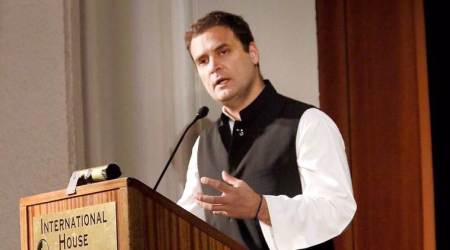 Rahul Gandhi speaking at University of California.
Rahul Gandhi speaking at University of California.
To understand the meaning, it is crucial to comprehend the context. Just one gruesome incident encapsulates India’s gargantuan challenge to be a thriving democracy. Last week, a respected feisty editor of a Karnataka daily, renowned for her sustained campaign against Hindutva bigotry and superstitious beliefs was slaughtered in cold-blood, shot multiple times at point-blank range in Bengaluru. Hours later, the vitriolic troll army of right-wing fundamentalists were treating her murder as just dessert. These are the same online hoodlums who wax eloquent on Indian culture, character and traditions, but indulge in character assassination of women journalists, and treat opposing voices as anti-national.
This is what Congress Vice President Rahul Gandhi, addressing young students on “India at 70: Reflections on the Path Forward” at the University of Berkeley, California, was alluding to when he said he feared that the idea of non-violence was under attack. Rahul’s repeated assertions that the dangerous cocktail of hatred, anger and polarization is destroying India’s social fabric is becoming a reality. Religious extremism has been steadily mainstreamed since prime minister Narendra Modi assumed charge three and a half years ago. We are playing with fire. Everyone could get burnt.
In the corporate universe, it is often said that companies inevitably exhibit the characteristics of their Chief Executive Officer. It isn’t so different for the country, either. Rahul’s allegation that there exists a powerful machine in divisive overdrive and that the formidable army of social media storm-troopers have been set up by the BJP is no exaggeration. Mr Modi follows some of these people, who are constantly peddling inflammatory content and intimidating many. Certainly, this messaging isn’t subtle at all.
From 2004-12, when the Congress-led UPA was in the saddle, India lifted as many as 140 million people out of poverty. Alongside, India registered phenomenal GDP growth rates peaking at 9.6%, and averaging 7.6% over a 10-year period. This must rank as one of the most outstanding achievements of any post-Independence government in India. As Rahul correctly stated, the Modi Sarkar is obsessed with the crème de la crème of Big Business; hence, his friendship with corporate czars, especially those in the natural resources-based commodities business. This crony capitalism prompted the Congress vice-president to label it ‘Suit Boot Ki Sarkar.’ But with the economic outlook looking grim, Modi made an about turn and quickly began to sing hosannas about MNREGA, GST, Direct Benefits Transfer, Aadhaar, and food security.
Rahul today stands vindicated on India’s economic challenges and social inequalities; there is no alternative to Congress’s “ inclusive growth model”. Free-market fundamentalists whom Modi publicly courted, such as Columbia professor Arvind Panagriya, have already called it quits. The one original decision of Modi, demonetization, has turned out to be a daylight fraud perpetrated on the people of India. India‘s GDP has crashed by over 200 basis points, pointing towards a near medium-term economic catastrophe.
Rahul’s candid admission that the Congress, in it’s second-term (2009-14), allowed a false sense of invulnerability leading to political hubris is refreshingly honest. Several professionals, like member of Parliament, Prof Rajeev Gowda and myself, moved laterally into the Congress party, long before the Aam Admi Party opened its doors to people like us. While certain political experiments such as US-style primaries have still not been executed, Rahul’s efforts to make internal systems transparent continue.
Rahul is the original outlier of Indian politics, not Arvind Kejriwal. He is aware of his dynastic baggage on which he is perpetually questioned. But as he has also said, the headstart does not guarantee assured triumphs.
Rahul Gandhi has experienced devastating tragedies at a susceptible age that can leave deep scars. But he has the resilience of a long-distance runner and draws emotional strength from the personal losses of his grandmother and father, who he knew was always within an assassin’s range. Hence, his statement, non-violence is hard work and not for the timid. The killers of Gauri Lankesh and those who ruthlessly masterminded it were cowards… If I don’t understand violence, who will? he said.
Lankesh is dead, as are Kalburgi, Pansare and Dabholkar. But as we all fight to keep the idea of India alive, Rahul Gandhi in Berkeley this morning reminded us that he will never allow us to forget it.

